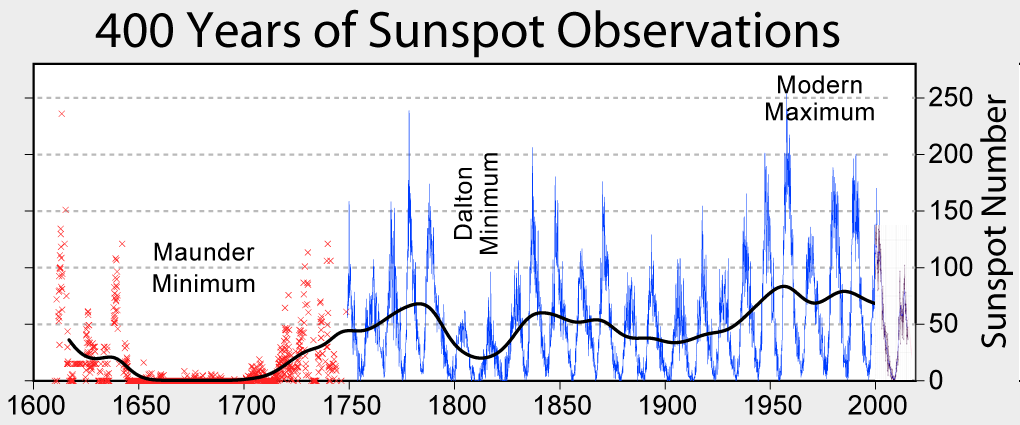You are viewing a single comment's thread from:
RE: Extinction or Evolution: Rise Of A Global Warmth.
Personally, I am more concerned that we are fast approaching a new Grand Solar Minimum and a little ice-age, similar to the last 3 that have occurred during the last 600 years (Dalton (1809-1821), Maunder (1687-1703) and Spörer Minima (ca 1440-1460):
Just look at the sunspot numbers:

400 year history of sunspot numbers
Image Source:
Interesting data @davidrhodes124. The sunspot numbers seems to approach a maximum between a 200 years intervals, increasing and decreasing at a steady rate. If i extrapolate correctly, from the data provided above, by the year 2150, the world would experience a drastic rise in sunspot maximum, in such a way that the heat waves would render the planet incapable of holding any form of life we currently know. But, even if we were to experience a little ice age condition, it would have either no long-term effect or would fail sustain itself under such high heat waves. What do you think about that?
I don't think that your extrapolation is correct. We are headed for very low sunspot numbers in the next solar cycle. In the past, such low sunspot numbers have been associated with "little ice-ages". Here's more up to date info. on sunspot numbers:
This is a pretty good article summarizing what we might expect during the next Grand Solar Minimum:
The next Grand Solar Minimum, Cosmic Rays and Earth Changes (an introduction) BY SACHA DOBLER ON 14. JANUARY 2018
Nice article. But if during a grand minimum, more cosmic rays are admitted into the earth's atmosphere, resulting in a dissociation of accumulated gases into a smaller subatomic particle, the energy released by this process is released into the thermosphere which might result in a reaction with the ozone layers(although i have no evidence of this), one thing seems certain. If we are approaching a grand solar minimum by the year 2200, it is still a pretty long time and the damage done a global warming of the earth's atmosphere may be too severe to be reversed. Moreover, a grand minimum according to the article would also cause an ocean warming due to eruption of underwater volcanoes, therefore causing a rise in the ocean level. Nonetheless, whether in the case of a grand solar maxima or minima, the odds all seem to be stacked against our favour. Droughts, famine and low humidity does not bid well for anyone including the plants. Makes me wonder if there is any hope for us.
Agreed, it's not good news for humanity looking forward!